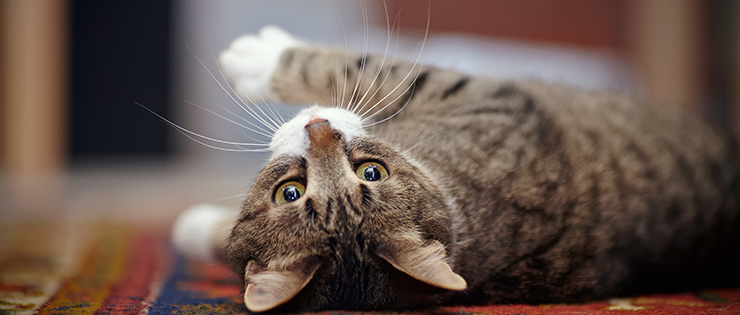
Anyone who has the privilege of being owned by a cat will attest to the comfort a cat’s purr brings to our lives. Whether it’s the continuous sound, the belief that your cat is content, or a combination; cats have this extraordinary ability to soothe us and the sound of their purr has a lot to do with it!
How do cats actually purr?
If we understand anything at all, it is that any behaviour stems from the brain. Our brains communicate with our bodies on everything, and it is no different with a cat and their purring behaviour. The voice box (larynx) has a range of abilities in communication and in combination with the movement of the diaphragm, a cat can use air it inhales to vibrate from the muscles oscillating inside these areas of its body. This is very similar to how we speak, but with an enhanced ability to do so during inhalation and exhalation. Try talking when you’re breathing… its an impossible feat.
We have previously thought that a cat’s ability to purr was one of few factors that separated the big cats from the small; with larger cats such as lions and leopards only able to roar. However, this form of classification has been found to be flawed, with recent research finding many cat species of all sizes able to purr, including cheetahs and cougars. Although neither you or I may be taxonomists, it is interesting to consider how the art of purring can decipher some cats from others. And, whilst it may not necessarily be correlated with size, there are certainly differences between cats who purr and cats who roar. Personally, I know which group I’d prefer beside me on the couch!
Why then do cats purr? We have previously believed that purring is a sign of contentedness, with the sound a behavioural indication of satisfaction and relaxation. But is that all there is to it? Are cats who purr by and large happy? The true answer is we don’t really know. Understanding the psychology of animals is a little trickier in some ways because we can’t actually ask a cat how they are feeling. And even if we could, we would need to ask hundreds of thousands of them about their emotions, and then average out their responses. So, all we can do is progress with technology and research, hoping that one day we will build a clear understanding of exactly what our pets think.
So what do we think we know?
Purring is most likely an emotional expression. Depending on the circumstances, a cat may be experiencing a range of emotions from, happiness and relaxation, to hunger, distress, or sometimes even pain. There is also fascinating research into whether purring may be a form of bone strengthening and regeneration. The speed of a purr is thought to occur at around 25 Hertz, which is also thought to be within the range of tissue regeneration. Though a little outside the litter box (pun intended), it is conceivable that whilst a cat is resting, they are also maintaining and improving their ability to hunt and survive. Cats don’t mess around do they!
I also do wonder as a behaviourist if cats learn that this behaviour results in relaxation, rather than as an outcome of relaxation. A sort of chicken or the egg question. What I mean by this is, do cats get rewarded by their owners when they purr? If we tend to be sitting on the couch with them whilst they purr, does it reinforce the behaviour? Are we shaping a behaviour that may not innately be a sign of happiness? What I love about studying animal behaviour is that the more we discover, the less we realise we know. So, for now, enjoy the time on the couch with your pet cat and get to know what these purrs could mean. The more we listen to our animals, the more we learn about them. For me, my cat Pacho is incredibly vocal. He purrs most of the time I am around, along with a combination of demanding meows when we walk past his food bowl. So, whilst many may agree cats are smarter than dogs… perhaps they also challenge the intelligence of humans too?